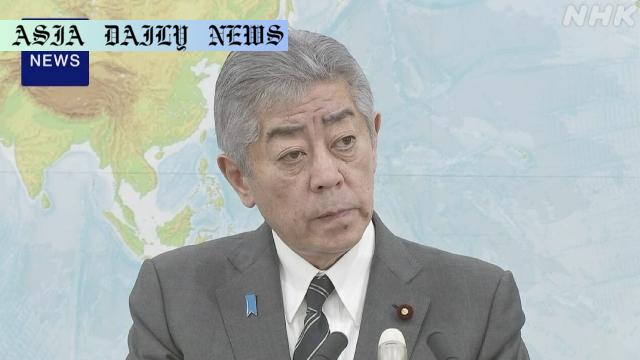NATO: Japan’s Iwaya Takeshi to collaborate with global partners at the NATO foreign ministers meeting in Brussels.

Japan’s Active Role in Global Diplomacy
Japan’s Foreign Minister Iwaya Takeshi is set to embark on a significant four-day visit to Brussels, Belgium, to participate in the NATO foreign ministers’ meeting. This initiative showcases Japan’s increasing involvement in global security and diplomatic affairs beyond its traditional regional focus. Iwaya’s agenda includes building a consensus on key geopolitical concerns, fostering partnerships with NATO members and non-members, and addressing pressing global issues.
Home to NATO’s headquarters, Brussels will host Iwaya and other key leaders, including foreign ministers from South Korea, Australia, and NATO members. Iwaya’s participation reflects Japan’s alignment with the NATO vision of maintaining and promoting a free, rules-based international order. By engaging with partners in this capacity, Japan reaffirms its stance against unilateral attempts to undermine sovereignty, such as Russia’s ongoing actions in Ukraine.
Focus on Unity Amid Rising Global Challenges
The decision to attend the NATO meeting is coherent with Japan’s efforts to bolster global unity during turbulent times. Iwaya’s commitment to conveying shared values like the rule of law underscores the proactive steps Japan is taking. The discussions will likely encompass topics beyond the ongoing geopolitical tensions in Eastern Europe. From China’s growing influence to North Korea’s missile threats, the discussions will set the tone for a cohesive and collaborative international approach.
Additionally, the significance of this meeting cannot be understated as global alliances face consistent tests. Iwaya’s plans to coordinate responses to unilateral forceful status quo changes align with Japan’s objective to act as a steward of Asian stability in collaboration with Western allies. Japan’s partnership with NATO symbolizes its evolving foreign strategy, positioning it as a bridge between Asia and Europe.
Economic Advocacy Amid Tariff Concerns
A key agenda during Iwaya’s trip involves a strategic meeting with US Secretary of State Marco Rubio. Japan intends to address the implications of recently announced US tariffs, seeking an exemption. Adverse economic ripple effects could significantly impact Japan’s economy, and this meeting exhibits Japan’s emphasis on proactive diplomacy to mitigate potential trade disruptions.
Iwaya’s dialogue with Rubio emphasizes the interconnected nature of diplomacy and commerce, highlighting the need for bilateral understanding amid complex international relations. Strengthening economic partnerships is a vital pillar of Japan’s policy, and such discussions play a pivotal role in sustaining global trade dynamics.
Strategic Collaboration with Allies
On the sidelines of the NATO meeting, Japan will participate in trilateral talks involving the United States and South Korea. These discussions signify the importance of regional stakeholders in devising strategies to address diplomatic challenges, ranging from North Korea’s provocations to broader security frameworks. Japan’s role in facilitating such discussions exemplifies its commitment to enhancing diplomatic influence and security measures globally.
By fostering cooperation among key global powers, Japan aims to strengthen trust and enhance collective security. This strategic alignment with global allies manifests as a significant step in addressing both immediate and long-term geopolitical matters effectively.
Conclusion: Strengthening International Alliances
As Japan takes a more proactive stance on the international stage, Iwaya Takeshi’s engagement in crucial dialogues carries significant weight. His efforts to forge stronger bonds with NATO allies and address challenges head-on reflect Japan’s dedication to global peace, stability, and progress. The emphasis on exchanging dialogues on rule-based international order and economic collaboration indicates Japan’s evolving role in the geopolitical landscape.
Through these efforts, Japan not only fortifies its own foreign policy goals but also solidifies its position as a reliable partner in addressing global security and economic concerns. Iwaya’s presence at the NATO meeting signifies Japan’s continued commitment to diplomacy and a world founded on unity and collaboration.
Commentary
Reflections on Japan’s Strategic Diplomatic Engagement
Japan’s decision to actively participate in the NATO foreign ministers’ meeting reflects a paradigm shift in its foreign relations approach. Traditionally seen as a regional actor focused on its immediate neighborhood, this outward-looking engagement signifies Japan’s readiness to assume a prominent role on the global stage. Foreign Minister Iwaya Takeshi’s efforts demonstrate the growing importance Japan places on alliances and international partnerships to address pressing challenges.
The inclusion of security concerns like Russia’s actions in Ukraine and China’s influence emphasizes Japan’s focus on broader global concerns. The proactive discussions on securing a free and open international order underscore Japan’s alignment with democratic values and global peacekeeping. The emphasis on rule of law is particularly significant in today’s world, where power dynamics are increasingly shifting, and unilateral changes to sovereignty are frequent.
Economic Diplomacy: A Critical Element
One cannot overlook the significance of economic diplomacy in Iwaya’s visit. The proposed discussion with US Secretary of State Marco Rubio highlights Japan’s balanced approach to integrating both political and economic interests in diplomatic missions. Trade disruptions caused by tariffs can have far-reaching impacts, and Japan’s move to seek exemptions showcases its dedication to safeguarding its economic environment through dialogue and mutual understanding.
This level of engagement with the United States reinforces the indispensable partnership between the two nations. While addressing economic concerns, it also strengthens bilateral ties, adding another dimension to Japan’s evolving diplomatic initiatives.
Fostering Regional Unity
The trilateral meeting between Japan, the United States, and South Korea signifies Japan’s continued focus on fostering unity at both regional and international levels. Such dialogues are crucial for laying out unified approaches, particularly in handling destabilizing threats like North Korea’s aggression.
As Japan builds stronger collaborations with partners across the globe, it is clear that the nation is actively redefining its geopolitical identity. These calculated moves underscore Japan’s dedication to its role as a responsible global champion of peace, stability, and prosperity.


